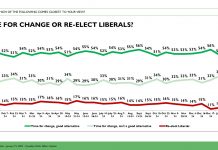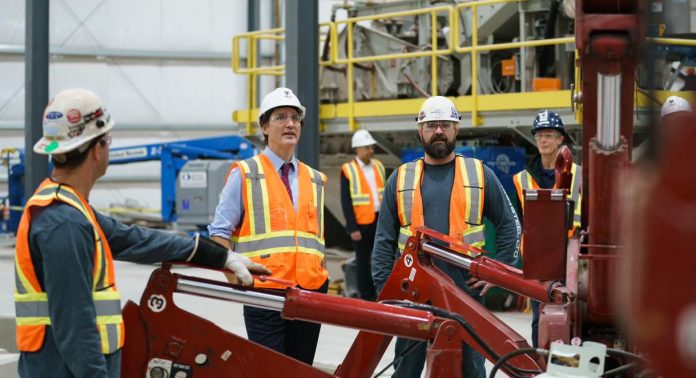telephone, lightbulb, sonar, insulin, electron microscope, Imax, Canadarm, Blackberry…(clean tech)
Mark McQueen
At last check, the price of a barrel of crude oil is off 32% over the past twelve months. Prices at the gas pump are down as a result, which brings some relief to Canadian families suffering from the impact of inflation on every part of their daily lives.
That said, Ontario residents saw their carbon tax increase to 14 cents/litre on April Fool’s Day, which means that about 10% of the cost of today’s tank of gas is the Liberal Party of Canada’s “Price on Pollution.”
Although the Liberal carbon tax has been around since 2019, which is more than enough time to get the program right, a recent report by the Parliamentary Budget Officer cast doubt on Justin Trudeau’s commitment that most Canadians would get a rebate that would be sufficient to cover the cost of whatever they paid in carbon taxes on a annual basis.
While partisans made great hay with the PBO report, the entire episode begs the question: if Mr. Trudeau’s intent was to rebate 100 per cent of the cost of “pollution” that most Canadian Hockey Moms pay to fill up their car or heat their rural home, what’s the point? If the Liberal government planned to truly insulate most Canadians from the negative financial impact of the carbon tax, how will an artificial increase in the cost of fuel change our society’s collective consumption behaviour if the majority of drivers and homeowners don’t actually wind up paying anything extra?
One doesn’t need to be either for or against a carbon tax to ask this basic question.
“If the Liberal government planned to truly insulate most Canadians from the negative financial impact of the carbon tax, how will an artificial increase in the cost of fuel change our society’s collective consumption behaviour if the majority of drivers and homeowners don’t actually wind up paying anything extra?”
Whether you believe or dispute that climate change is a thing, both the Liberal and NDP parties use the carbon tax as their political answer to what continues to be on the minds of many: a 2022 Pew Research survey found that “climate change is the top global threat, [according] to a median of 75 per cent of people across 19 countries.”
In recent years, the carbon tax topic has purportedly bedeviled Conservatives across Canada. Former Ontario PC Leader Patrick Brown supported a carbon tax at his first convention as leader in 2016, while Andrew Scheer won the federal leadership a year later as a known opponent of the concept.
As a political theory, Conservatives are told that they should favour a carbon tax, according to folks as diverse as Andrew Coyne and former Republican Secretary of State James A. Baker III. As Brian Mulroney pointed out when he advocated for the GST, transparent consumption taxes have a place in society. I recall he and Mike Wilson being vilified for it at the time — and let’s not forget Jean Chretien initially promised to “axe the tax,” only to deny his own public statement by the time the 1997 election came around (as me and the Ontario election comms team enjoyed reminding voters with our billboards and bus shelter ads).
As for gas taxes specifically, Canadians have been paying them for as long as I can remember; long before Climate Change was was a political issue. In 1979, back when gas was 21.5 cents a litre, a PC government was toppled following a proposed a 4 cents-per-litre increase in the existing federal excise tax on gasoline. That farmers, fishermen and public urban transit were to receive a 10 per cent gasoline tax rebate wasn’t enough to save then-Prime Minister Joe Clark’s political skin.
During the Stephen Harper era, rather than cut gas taxes, his government reduced the GST by two percent, a move that returned $5 billion of taxes to Canadians.
The point of this brief history tour is to make a simple point: For decades, different governments of different stripes have pushed and pulled on different levers to balance the sources and uses of government revenue. There will be taxes in 2024, no matter who holds the keys of office, of that we can be sure.
Whether the HST is higher or lower, whether gas taxes go up or down, whether corporate taxes are raised or reduced, whether the carbon tax is eliminated under a Conservative government of Pierre Poilievre or increased, from the current 14 cents-per-litre, to 40 cents, by a newly-elected Trudeau/Singh Administration, whether government waste can be cut quickly and in a material fashion, Canadians will have a government that has to be funded.
And there are only so many tools to fund it.
As for greenhouse gas emissions, Canadians have been making individual choices for years. Back when Ontario was still burning coal to keep the lights on, Wellington Financial LP was the first tenant in the massive 161 Bay Street office complex to sign-up for green electricity via Bullfrog Power. Many of you have acquired electric or hybrid cars, and longer-lasting LED lightbulbs are now the norm. Some rural construction builders have turned to thermo. Schoolkids think nothing of carrying around a refillable bottle. There are countless ways to have a personal impact on emissions, if that’s a choice that you want to make.
That Canada’s share of annual global greenhouse gas emissions is reported to have dropped from 3% to 1.5% post-World War II is a function of many things; but what can’t be denied is that if Canadians cut that 1.5% to zero over the coming months, by magically turning the clock back ~200 years, countries such as China and Panama seem intent on continuing to build new coal plants to support their economic and urbanization needs. Our sacrifice will have been in vain.
“Citizens of developing nations are going to consume carbon to drive their cars, heat their homes, light their school classrooms, run their factory machinery and all the other things that we came to take for granted during Canada’s rampant industrialization last century.
Whether they buy their oil, natural gas and coal from Canada or Russia they’re going to get it from someone.”
Billions of our fellow global citizens want the same modern conveniences and standard of living that we enjoy here in Canada. There is little doubt that, until there’s a more cost-effective, environmentally-friendly and scalable method, the citizens of developing nations are going to consume carbon to drive their cars, heat their homes, light their school classrooms, run their factory machinery and all the other things that we came to take for granted during Canada’s rampant industrialization last century. Whether they buy their oil, natural gas and coal from Canada or Russia, they’re going to get it from someone; which means preventing Canadian resources from getting to market as our contribution to the U.N.’s climate change goals is a fool’s errand. Likewise, even if EV vehicles get to 100% market penetration in Canada by 2030, the population of Indonesia is growing ~30 million per decade; invariably replacing our forgone carbon footprint almost to a person.
That said, there’s an opportunity.
The Paris Accords of 2030 or 2050 leave no doubt that many industrialized nations are going to spend hundreds of billions on products and services that are designed to reduce the world’s carbon footprint.
This is Canada’s win-win opportunity. Rather than returning to the 1840s life of my late Mother’s Garafraxa, Ontario farm ancestors, Canadian scientists, researchers, entrepreneurs, investors, policy-makers and political representatives can make it our collective mission to do what other Canadians have done before: solve complex global problems.
Over the last 150 years, Canadians have made many ground-breaking discoveries and technological advancements that have had a memorable global impact: the telephone, the lightbulb, sonar, Insulin, the electron microscope, the world’s first pacemaker, Imax cameras, the cystic fibrosis gene, the Canadarm, the first Ebola vaccine, and let’s not forget the ubiquitous Blackberry.
Whether or not your see the Candu Reactor or Avro Arrow as a success or a failure, both initiatives speak to a time when Canadians were proudly prepared to bring new technologies to the world, rather than tinker on the intellectual property of another nation (see prior posts ““60 additional intern jobs” is not an Innovation Strategy” April 18-23 and “Canada can create New Economy jobs without subsidizing foreign corporate shareholders in the process” April 28-23).
Canada cannot tax its way to solve worldwide concerns about “the climate.” What we can certainly do is put hundreds of thousands of people to work on carbon capture, battery storage technology, small modular nuclear reactors, bio-fuels, geothermal and all of the other tangible opportunities that are recognized as elements of what could end up being a “national portfolio” of clean tech jobs and Canadian-owned intellectual property.
Not every investment will work, and some won’t scale. Canadians can be confident that our 150+ year track record of innovation didn’t happen by accident. If Canadian taxpayers can afford a $13 billion contribution to a single Volkswagen battery plant, surely we’d be wise to invest in our own people, developing our own clean technology companies, knowing that the world is looking to buy these products and services as soon as we can pull each and every one of them off.
Whether or not there’s scientific consensus that climate change is a true threat to civilization, Canada has an opportunity to develop, build and sell the products and services that so many G-20 and developing nations are looking for. That’s not up for partisan debate, and whatever the future may hold for Canada’s existing natural resources, our economy and environment will be better off if we use ingenuity, and not circular tax schemes, to meet this global need.

Mark McQueen: Funder of growth companies + public service roles. Pearl Jammer. Opinions are my own; Not investment advice. Toronto, Ontario, Canada. Check out my Substack at https://markmcqueen.substack.com/
























